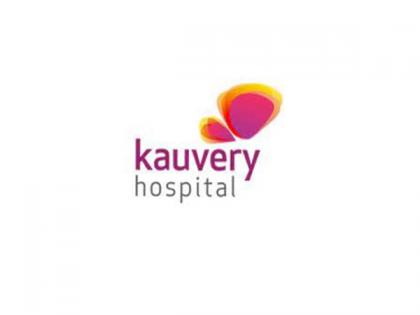Kauvery Hospital Alwarpet uses ECMO-CPR to save 62 aged man, who suffered complex heart attack with refractory Cardiac Arrest
By ANI | Updated: June 20, 2025 17:33 IST2025-06-20T17:29:01+5:302025-06-20T17:33:36+5:30
VMPL Chennai (Tamil Nadu) [India], June 20: In a remarkable feat of medical precision, Kauvery Hospital Alwarpet has saved ...

Kauvery Hospital Alwarpet uses ECMO-CPR to save 62 aged man, who suffered complex heart attack with refractory Cardiac Arrest
VMPL
Chennai (Tamil Nadu) [India], June 20: In a remarkable feat of medical precision, Kauvery Hospital Alwarpet has saved the life of a 62-year-old man through an advanced cardiac procedure involving ECMO-CPR (Extracorporeal Cardiopulmonary Resuscitation) a rare, complex intervention reserved for the most critical cases of cardiac arrest.
The patient, who was rushed to the Emergency Department with a major anterior wall myocardial infarction, was found to be in cardiogenic shock (when the heart struggles to pump blood to the body) with dangerously low blood pressure and reduced perfusion to vital organs. As he was being shifted to the Cath Lab for an emergency angioplasty, he went into cardiorespiratory arrest (heart and lung functions stopped). Despite high-quality conventional CPR, there was no return of spontaneous circulation placing him in refractory cardiac arrest, a condition where survival is rare without advanced support.
Recognizing the gravity of the situation, the team comprising Dr R Anantharaman and Dr S Srikumar swiftly initiated ECMO-CPR, wherein blood was drained via cannulation from the femoral vein(a major deep vein in the leg that runs alongside the femoral artery), routed through an artificial membrane (oxygenator) that removed carbon dioxide and added oxygen, and then pumped back into the body through femoral artery. This external circulatory support maintained oxygenation and other organ perfusion, allowing the heart and lungs to rest while the underlying cause, blocked coronary arteries, could be treated.
Senior Interventional Cardiologist Dr. R. Anantharaman explained, "This patient had zero cardiac output while being wheeled into the Cath Lab. ECMO-CPR provided the precious time we needed, with oxygenated blood circulating to the rest of the body safely, we were able to perform a high-risk multivessel coronary angioplasty and stenting despite the heart being non-functional. Slowly, cardiac contractility returned."
Following the procedure, the patient was shifted to the Coronary Care Unit (CCU) on ECMO and later transitioned to Intra-Aortic Balloon Pump (IABP) support. However, recovery was not linear. He developed a VT (ventricular tachycardia) storm, a life-threatening arrhythmia which was initially managed with medications and a stellate ganglion block, a nerve-numbing injection administered in the neck. As the VT episodes persisted, Electrophysiology team lead by Dr Deep Chandh Raja intervened with a radiofrequency ablation, successfully eliminating the arrhythmic focus. With a now stable rhythm, his heart function recovered to over 50% ejection fraction, and he was gradually weaned off all mechanical supports, mobilized and discharged home.
Dr.S.Srikumar, Senior Consultant Interventional Cardiologist observed " The chances of a patient having sudden cardiac arrest following an acute myocardial infarction surviving to discharge is less than 15% with conventional CPR techniques, but the odds of his survival and going back home is doubled to around 30% with the timely initiation of ECMO-CPR."
Dr. Aravindan Selvaraj, Co-Founder and Executive Director, Kauvery Group of Hospitals, said, "Performing a high-risk procedure like ECMO-CPR requires not just timely decision-making, but also a well-trained multidisciplinary team, advanced cardiac infrastructure, 24x7 Cath Lab access, and round-the-clock ICU support. Our ability to seamlessly bring together interventional cardiologists, electrophysiologists, intensivists, anesthesiologists, cardiac surgeons, perfusionists, and critical care nurses is what made this outcome possible"
The patient was discharged after a 21-day hospital stay, fully mobile, neurologically intact, and emotionally overwhelmed with gratitude. This success story also shows the need for greater awareness about ECMO-CPR, a modality that can improve survival in up to 30-50% of patients with refractory cardiac arrest, when executed in time and in a center equipped with the right expertise and infrastructure.
(ADVERTORIAL DISCLAIMER: The above press release has been provided by VMPL.will not be responsible in any way for the content of the same)
Disclaimer: This post has been auto-published from an agency feed without any modifications to the text and has not been reviewed by an editor
Open in app